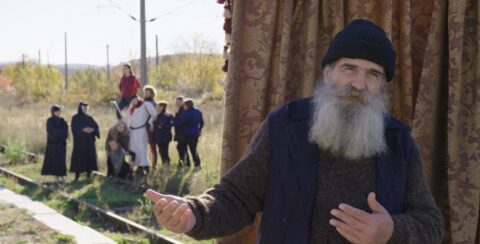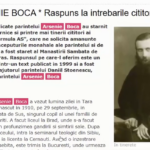July 2, 2023 / Journey Into Cinema
Redmond Bacon

Seasoned documentarian Alexandru Solomon begins Proxima Competition entry Arsenie. An Amazing Afterlife (2023)with a priest bemoaning homosexuality’s effect upon the country, threatening the very fabric of Romania itself. The cult icon behind these views is the iconic priest Arsenie Boca, praised for his resistance to communism and devotion to traditional values. Dying just before the revolution of 1989, his visage forms part of the Orthodox Church’s stranglehold on Romanian rhetoric.
As a Jewish man shocked by the dangerous attitudes that have taken over politics and television, Solomon’s previous attempts to confront such sentiment haven’t worked — one priest shockingly tells him he can just convert to Christianity. In his latest film, he tries a different tack. He attempts to get into the heads of the devoted instead, creating a fascinating, rather pessimistic hybrid documentary exploring the paradoxes and mysteries of faith.
Touring the pilgrimage sites of Boca, including his birthplace, the monastery he helped build and places he preached, Solomon ropes in a variety of faithful actors to engage in recreations of key moments of his career. With an open-hearted approach that lays bare the artifice of documentary filmmaking, this project appears to be an excuse merely to gather devotees in one place and find out why they hold such strong religious beliefs.
In a makeshift, yet crude split diopter shot (see above), interviewees are often caught against a rug, shoddily erected as a studio curtain in the middle of a field while the other half of the frame captures odd recreations in the background. He gets great mileage out of simply talking to the participants about their relationship with Boca, unveiling their prejudices and superstitions, acutely depicting how religion filled the gap when communism came to its violent end. Discussions of anti-semitism, anti-Roma sentiment, homophobia and talk of miracles all combine in a seemingly unreal reflection of contemporary Orthodox mores. Progressive views are left for another movie.
While one montage is particularly effective in seeing how his likeness has spread across markets, shops, online resellers and more, as well as the Orthodox Church’s attempts at canonisation, Solomon doesn’t go much deeper into the obvious grift behind the Boca racket, arguably Romania’s pitiful attempt to have a marketable Mother Theresa-like figure of their own. Most interesting was Boca’s foresight in this respect, selling pictures of himself back in the 50s in order to enrich himself. A man as paradoxical as modern Romania itself, he is certainly worth investigating, yet the final meaning is frustratingly elusive.
In the end, the film doesn’t provide much of an answer to the questions plaguing Solomon, collecting a cacophony of responses while failing to provide a coherent thesis. Solomon even admits as much, preferring to finish by mentioning Arsenie’s paradoxical wish to see a red flag hoisted above the Vatican. But it is this very openness, evoking a watered-down Radu Jude movie, that stops the film from falling into culture war traps, embracing the messiness of modern-day Romanian life instead of trying, perhaps in vain, to fix it. The afterlife of communism, fascism, religion and prejudice, appears to linger very long indeed.
- Tags:
- Reviews










